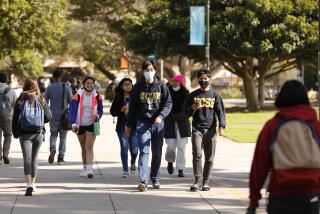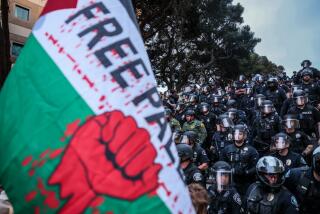Students Inspired by a Meeting of the Minds With Nobel Laureates
- Share via
IRVINE — The session started stiffly, nine distinguished Nobel laureates sitting at one long table and awkward-looking students at the other.
No one wanted to ask the first question.
But then one young man rose to ask about genetic cancer links, another about saving the ozone.
And when Liem To, 18, of Tustin, brought up the potential limits of human space travel, the laureates seized upon his question with zest, spontaneously musing about the horizons of science as if this were some high-level summit instead of an informal backstage meeting over sandwiches that came in plastic boxes.
Students left the Saturday meeting at UC Irvine less awed than revved up by this brief brush with some of the world’s greatest scientific minds.
“They seem genuinely concerned with science. They’re really down-to-earth people,” said To, a UC Irvine freshman and one of the handful of high school and college students who met with scientists during a campus conference of Nobel laureates.
His question about whether “there is a limit to how fast and far we can go” sparked the most lively discourse of the session.
Charles H. Townes, who won the 1964 Nobel Prize in physics, predicted that we will explore other planets, perhaps even travel to other stars.
Then fellow laureate J. Michael Bishop swiftly turned the discussion’s course by bringing up “The End of Science,” John Horgan’s controversial book that proposes that the great scientific discoveries are already history.
“The end of science? It’s just the stupidest thing I can imagine,” said Bishop, who won the 1989 Nobel Prize in physiology for discovering that normal cells encompass genes capable of becoming cancer genes. “I think we’ve hardly scratched the surface, myself.”
Bishop’s cancer research catalyzed questions from curious students, including Meredith Rosser, 21, an Occidental College student in biochemistry who asked him where cancer treatment is moving.
Genetic research could produce new approaches in years to come, Bishop hypothesized. “Your generation, not mine, may see a major change in how cancer is treated,” he said.
Townes, Bishop and five other Nobel laureates affiliated with California institutions gave back-to-back lectures Saturday at UC Irvine’s Irvine Barclay Theater. The rare gathering, coinciding with this year’s Nobel presentations, was designed to honor Nobel laureates from California.
During their lunch break, some laureates met with college students and a small group of high school honor students selected by their teachers. The gathering with students was intended to stimulate their interest in the sciences.
After the formal question-and-answer session, students clustered around the scientists, some asking for advice about what types of schools to attend.
Paul Berg, awarded the 1980 Nobel Prize in chemistry, urged them to seek out a stimulating academic atmosphere.
“Without the challenge, you won’t really blossom,” he said.
Bishop recalled how he attended a little-known liberal arts college but still made an easy transition to medical school.
The encounters left some students astonished at how friendly and easygoing these great minds could be.
“They’re just like regular people,” said Jackie Amon, 15, of Costa Mesa. “They don’t make you feel stupid. It was like talking to anyone walking down the street.”
More to Read
Sign up for Essential California
The most important California stories and recommendations in your inbox every morning.
You may occasionally receive promotional content from the Los Angeles Times.













